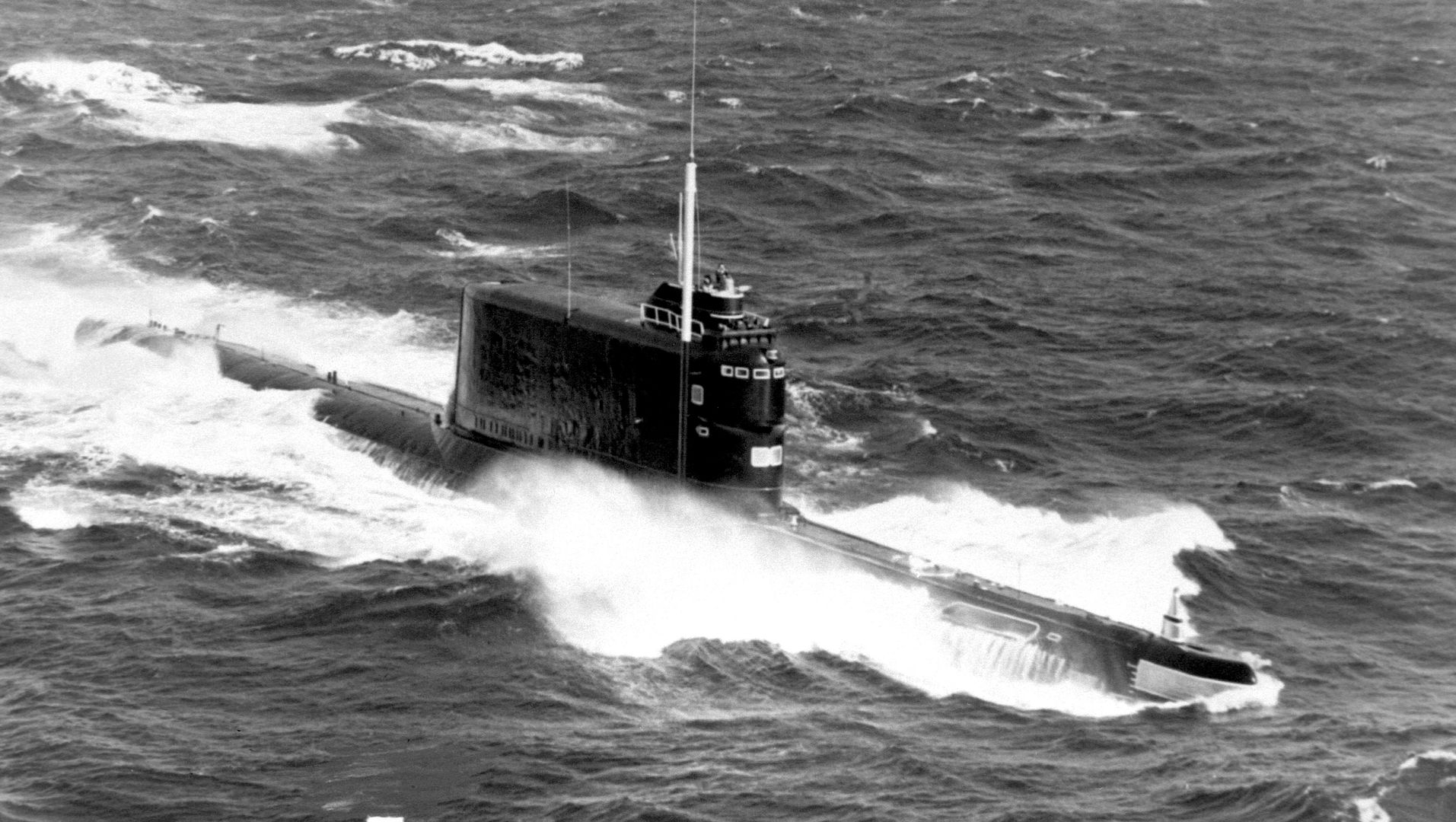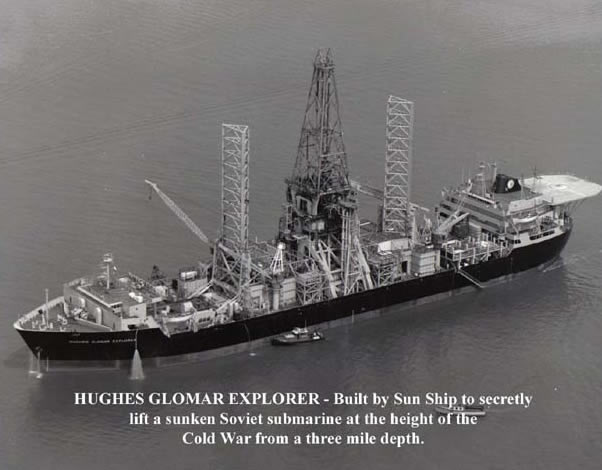
Posted on 02/13/2010 12:59:40 AM PST by ErnstStavroBlofeld
The Central Intelligence Agency (CIA) for the first time has revealed details about an ultra-secret Cold War-era project to raise a sunken Soviet submarine from the depths of the Pacific Ocean in 1974.
The high-risk salvage operation, code-named ‘Project Azorian’, had been shrouded in secrecy for decades but the spy agency broke its silence in newly-declassified documents published yesterday by an independent watchdog, the National Security Archive.
The documents, drawn from a 50-page article written for an in-house CIA journal, recount the daring bid approved by then-president Richard Nixon to raise the submarine using a specially-designed ship, the Glomar Explorer.
Newspaper articles in 1975 first uncovered the operation but the Central Intelligence Agency initially refused to confirm its existence and had declined requests for information even after the Cold War ended.
"They've been holding on to it for years," John Prados, an author and analyst at the National Security Archive, said.
"The release of this article greatly advances our knowledge of Project Azorian."
The episode began after a Soviet Golf-II submarine, the K-129, sank in 1968 in an accident 1,560 miles northwest of Hawaii, the cause of which remains unclear. The Soviet sub, which was carrying three ballistic missiles armed with nuclear warheads, offered a potential boon to US intelligence agencies if it could be lifted out off the ocean floor and examined
(Excerpt) Read more at zeenews.com ...

He is fine. His arm is still giving his problems.


"I am determined to elect a president of our choosing this year and one who will be deeply indebted, and who will recognize his indebtedness. Since I am willing to go beyond all limitations on this, I think we should be able to select a candidate and a party who knows the facts of political life....If we select Nixon, then he, I know for sure knows the facts of life."
-- from handwritten memos by Howard Hughes, early in the 1968 presidential campaign

Howard Hughes lend his name to the project to support the cover story.Hughes and his companies did not have any actual involvement in the project.
September 09, 2008
Joe Massucci
A lost Soviet submarine. A mad, reclusive billionaire. A dangerous covert salvage from the bottom of the sea. A Cold War espionage thriller? No, it’s the true story of a unique recovery ship that’s now getting a new lease on life with oil and gas companies.
The Glomar Explorer is a massive 618-foot-long, 50,000-ton deepwater drilling vessel, which BP contracted to carry out drilling operations in its Gulf of Mexico Atlantis oil field. However, the ship was originally designed for a far different mission. Built during the 1970s for tycoon Howard Hughes, her space-age claw would pluck precious minerals from the deepest ocean floors.
Or so the world was told.
The story of the Hughes Glomar Explorer actually began back in February 1968, when K-129, a Soviet Golf-class submarine, disappeared mysteriously in the Pacific Ocean some 600 miles northwest of Hawaii. Despite an intensive search, the Soviets couldn’t find a trace of their sub. But thanks to a top-secret naval intelligence system based in Pearl Harbor, the United States Navy knew that K-129 had sunk. And, more important, where.
K-129 carried the Soviet’s latest nuclear missiles and torpedoes. She also carried their most advanced navigation system, coding devices and code books. If the sub could be salvaged, it would be the intelligence coup of the Cold War.
There was one problem. The sub lay on the bottom in 17,500 feet of water – more than three miles down. And experts said it couldn’t be salvaged.
Raising the beast
The CIA ignored the experts and hired Houston-based Global Marine Inc. to raise K-129. Because no submarine could operate at that depth, a special salvage ship had to be built that would incorporate radically new technology – all under the cover of reclusive billionaire Howard Hughes’ seabed-mining venture.
However, the ship couldn’t lift the submarine alone. A submersible mining barge equipped with a massive claw positioned beneath the ship would serve as an underwater platform to lift and then as a hanger to hide the recovered submarine.
If the Soviets discovered the ship’s true mission, the Hughes Glomar Explorer could be sunk.
The vessel’s crew faced hazards that would sober even the bravest. First, the nuclear warheads, exposed to immense water pressure, might be unstable and could possibly explode during retrieval. Perhaps even more dangerous, the salvage crew would be alone on a vast ocean. If the Soviets discovered the ship’s true mission, the Hughes Glomar Explorer could be sunk.
And, finally, there was the weather. If a storm hit while lifting K-129, the pipe string could snap, tearing the ship in half.
Heavy lifting
By June 1974, after extensive preparations, the Hughes Glomar Explorer and the submersible barge were ready. By now Howard Hughes was a madman in failing health, and President Richard Nixon had resigned in disgrace. The Cold War raged on.
The Hughes Glomar Explorer moved into position over the wreck in July. But President Ford didn’t grant permission to begin the operation until August 11. Working under immense time pressure because of a rapidly closing weather window, “Project Jennifer” was carried out over the next month. Soviet spy ships arrived and began circling – and watching.
The massive claw with its hydraulic fingers grappled the sub, and lifting began. Slowly the submarine was hoisted from the seabed. When the ship was carrying the full weight of the sub, 2,500 tons, she sat seven feet lower in the water. The operation continued until the wreck was some 5,000 feet from the surface. Then disaster struck.
Part of the claw broke off and the wreck began to disintegrate. A nuclear missile slipped from its launch tube and tumbled back to the seabed. There was no detonation. A nervous crew continued lifting. The remaining section of the sub was small enough to fit into the ship’s “moon pool,” a huge opening in the center of the ship, where it was dissected and analyzed.
Cover blown
The world remained in the dark about the ship’s true mission, which the CIA code-named “Project Jennifer.” However, that changed when four burglars broke into Hughes’ office and stole thousands of dollars in cash and files about the project, scattering papers as they fled. Assuming the files contained business documents, the thieves demanded a million dollars for their return. The FBI and the Los Angeles police were brought in.
Most of the documents were ultimately recovered but, despite tight secrecy, details leaked to the media. In February 1975, Jack Anderson’s column in the Los Angeles Times broke the story of Project Jennifer to the world. The ship’s cover was blown, and plans to return that summer to recover the remainder of the wreck were abandoned.
Exactly what the US Navy recovered remains a debate even today. Some say that the entire submarine was raised and that the claw-breaking story was further “cover.” Officially, only the forward 38 feet of the submarine was salvaged, and with it a pair of nuclear-tipped torpedoes, several encoding devices, various code books and the bodies of six sailors, which were given a solemn Soviet burial at sea. In 1993, then-CIA director Robert Gates gave a videotape of the burial to Boris Yeltzin, the former Soviet leader, as a confirmation that the Cold War was over.
Other missions
So what became of the Hughes Glomar Explorer?
She was transferred to the Navy in 1976 where she stayed essentially mothballed for the next 20 years. Global Marine, one of the largest offshore drilling contractors in the world, came up with a better idea. In 1996, the company signed a 30-year contract with the Navy to lease the vessel and totally recondition and convert her into a one-of-a-kind deep-sea drill ship.
After $180 million in conversions, the ship, renamed simply the Glomar Explorer, can drill in 7,500-foot waters and, with some modification, up to 11,500 feet – 2,000 feet – deeper than any existing rig.
Now retired from CIA service, the Glomar Explorer, whose very name recalls Cold War intrigue and adventure, is no longer salvaging sunken submarines. Still a proud vessel, she’s now contracted to companies like BP, helping them find oil in the Gulf of Mexico’s ultra deep water.
This article originally appeared in Beyond magazine, Fall 2001.
ping
^__^
K-129, a Soviet Golf-II Class submarine, sank in the Pacific on April 11th, 1968 with a full complement of nuclear ballistic missiles on board. The CIA concocted a plan to enlist the billionaire Howard Hughes to build a ship that would be capable of lifting the sub off the ocean floor 17,000 ft. below.
It had long been known the ocean floor was littered with chunks of magnesium mixed with other useful metals. Hughes made it known that he was going to build a ship The Hughes Glomar Explorer for the purpose of harvesting these metals. Other mining companies were so taken in that they began their own deep-sea mining operations. In fact, the entire enterprise was a cover for the CIA.
In June of 1974, the completed Glomar Explorer attempted to lift the ship. It was partially successful, as the sub broke apart during the operation. Only part of the sub was ultimately recovered - including the bodies of 8 Soviet sailors who were filmed being buried at sea in a bizarre ceremony. What materials were actually recovered are still classified. More details can be found here.
One wonders who the CIA could even turn to these days to pull off that sort of an undertaking. The bottom line is: they just don’t make billionaires like they used to; do pompous blowhards like Larry Ellison, CEO of Oracle, or geeky shut-ins like Steve Case of AOL and Michael Dell of Dell Computer even hold a candle to Howard Hughes?
How did that go: Order in the court. The judge is eating beans. He is sitting in the bathtub sinking submarines.
I have never heard that before.LOL
:)
I’m not that old. I heard it from my mom.
Nothing in the article that I see that hasn’t been published before. Nothing about Sunnyvale.
God, now I am going to have to watch that movie. I have been avoiding it because I am homo-phobic.
It’s a great movie and a “laugh-a-minute” for those who lived through those times... :-)
You have convinced me.:-)
.. the effect however is clear in the minds of some. Ninety-nine men lost when the Soviets lured the U.S.S Scorpion into a trap believing that a collision with the U.S.S. Swordfish sank their boat.
Not one word about the U.S.S Scorpion here or in the article?
In possession of the latest encrytion gear taken from the U.S.S. Pueblo and virtual daily updates by John Walker the Soviets could indeed track the Scorpion
According to the book All Hands Down about the 1968 destruction of the submarine USS Scorpion investigators were ordered that hostile action was not to be given any consideration.
Though it is very likely that the Soviets lured the Scorpion into a trap the LBJ administration and the Nixon administration did not want to hear it.
The book quotes a source involved in the official investigation: "Ninety-nine men are not worth [what would follow]. Other reasons had to be found for the loss."
OK so an immediate war with the Soviets (nukes and all) would be a hefty price to pay but couldn't Nixon/Kissenger have delayed détente? Or something!
Disclaimer: Opinions posted on Free Republic are those of the individual posters and do not necessarily represent the opinion of Free Republic or its management. All materials posted herein are protected by copyright law and the exemption for fair use of copyrighted works.